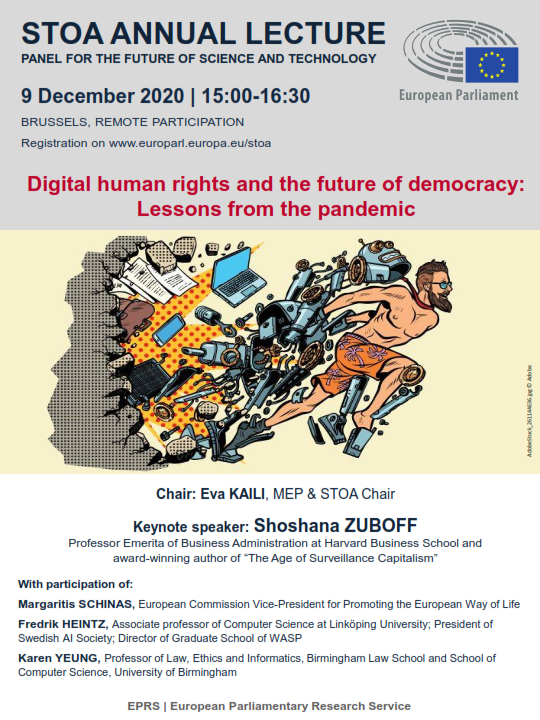Written by Mihalis Kritikos,

Digital technologies are increasingly shaping our economy, politics, and society. As many online activities leave a digital trace, our digital activity allows automatic gathering of a wealth of behavioural data. However, digital processes and technologies are no longer only monitoring our behaviour, but via the use of predictive analytics, are also influencing it in a pervasive way. As major internet platforms increasingly frame public discourse, concern is rising as to how artificial intelligence (AI) and other emerging digital technologies are affecting our lives and our societies.
The accelerating commodification of personal data used for the design, training and validation of predictive algorithms and the extensive use of highly targeted behaviour modification techniques have become a new source of legal and ethical concern. Given that our decisions are increasingly ‘nudged’ by powerful data-mining algorithms, the threat of algocracy – ‘rule by the algorithm’ – challenges the rule of law and erodes human agency, privacy and even democracy, in many ways.
The ongoing pandemic has accelerated our dependence on the digital world and our transformation from data subjects to data suppliers. Although digital technologies have been an important aspect of our crisis response in terms of detection, treatment and prevention, there are concerns that this increasing digitisation may lead to augmented surveillance, massive digital dependence and high epistemic asymmetries. Coronavirus as the first pandemic of the ‘algorithmic age’ is exposing the pathologies in the data governance ecosystem, which has left unaccountable private actors in possession of both our data, and the means to extract economic value from it.
How can we defend human rights in the digital age and shape a framework for democratic and egalitarian governance? How can we manage the disruption that digitalisation imposes on democracy and human rights? Can our political and human rights be safeguarded in the digital age? Whose responsibility is it to tackle these risks and strengthen data sovereignty and algorithmic transparency underpinning a fully democratic digital society and rights-preserving data ecosystem? Can the rule of law and ethics help us reclaim our data sovereignty and uphold the principles of liberal democracy? Do online platforms view users of digital technologies as citizens with full control of their data or mere data suppliers? How is power in the digital world expressing itself and how is it distributed?
This year’s STOA Annual Lecture is expected to offer some well-informed answers to these crucial questions. The 2020 Annual Lecture will focus on the disruptive effects of the digital revolution upon democracy and the protection of civil liberties and human rights in the context of the current pandemic. It will examine the multifaceted impacts of digital technology on the notion of democratic citizenship and our ability to remain in control of our choices and data. The Annual Lecture 2020, led and moderated by STOA Chair Eva Kaili (S&D, Greece), will investigate the challenges associated with the growing ‘datafication’ and ‘platformisation’ of our societies, the need to reclaim data sovereignty in the era of AI, and address the plurality of socio-ethical challenges of digitisation.
The Annual Lecture will open with remarks from Eva Kaili, following which European Commission Vice-President for the European Way of Life, Margaritis Schinas, will deliver an introductory speech. The keynote lecture will be delivered by Shoshana Zuboff, Charles Edward Wilson Professor Emerita of Business Administration at Harvard Business School, and award-winning author of ‘The Age of Surveillance Capitalism’. Professor Zuboff is a world-class thinker whose research is focused on the contested digital transition, its relationship to the future of capitalism, and the consequences for individuals and society.
A panel discussion of key new technologies will follow, with the participation of Members of the European Parliament and two eminent experts: Fredrik Heintz, Associate Professor of Computer Science at Linköping University, Sweden and President of the Swedish AI Society, and Karen Yeung, Professor of Law, Ethics and Informatics at the University of Birmingham Law School and School of Computer Science. The event will close with an (online) public debate.
Interested? Register for the lecture and join the debate.








[…] Source Article from https://epthinktank.eu/2020/12/02/digital-human-rights-and-the-future-of-democracy-lessons-from-the-… […]
[…] session reviewed topics of specific relevance to STOA: what has been learned from Covid‑19 about our relation with technology and what the virus has […]